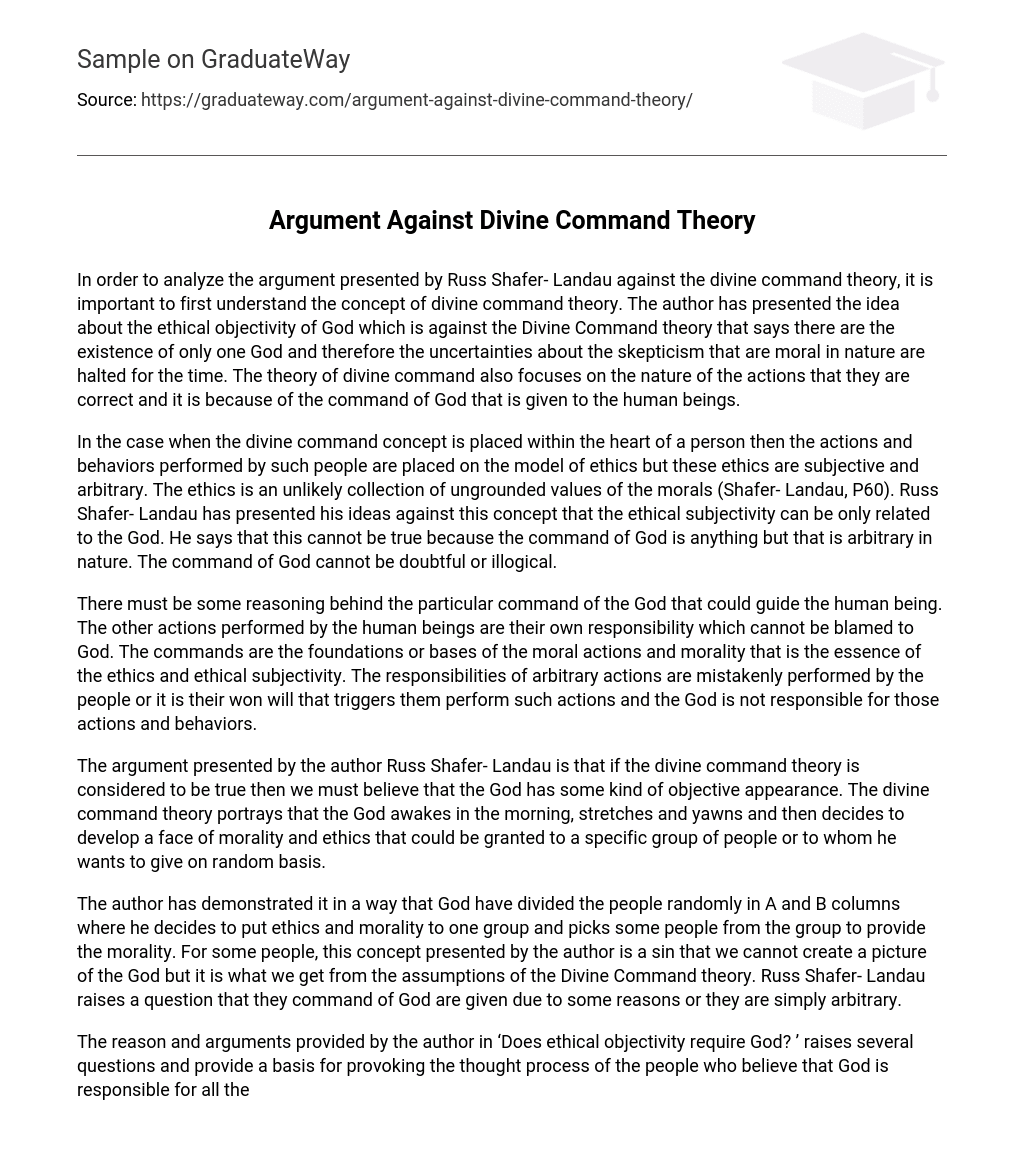Russ Shafer-Landau presents an argument against the divine command theory. To understand this argument, it is necessary to grasp the concept of divine command theory. The theory posits the existence of one God and asserts that moral uncertainties are eliminated due to this belief. Additionally, divine command theory emphasizes that correct actions are determined by God’s commands to humanity.
According to Shafer-Landau, when someone internalizes the divine command concept, their actions and behaviors align with a subjective and arbitrary model of ethics. Shafer-Landau argues against this concept, stating that ethical subjectivity can only be attributed to God. He asserts that God’s commands are not arbitrary and cannot be doubted or seen as illogical.
The command of God serves as a guiding principle for human beings, providing a rationale for their actions. Human beings are accountable for their own behavior and cannot attribute it to God. These commands form the basis of moral actions, which in turn define ethics and ethical subjectivity. The responsibility for arbitrary actions lies with individuals, either due to their own mistake or their own will that compels them to engage in such behaviors. God is not responsible for these actions and behaviors.
The author Russ Shafer-Landau argues that accepting the divine command theory means believing in an objective appearance of God. According to this theory, God wakes up in the morning, stretches, and yawns before deciding on a set of morals and ethics to be granted either to a specific group or randomly.
The author presents a scenario where God randomly divides people into two groups: A and B. One group is given ethics and morality, and the author selects certain individuals from that group to provide these moral principles. Some people view this concept as sinful, as it implies that we can create a representation of God. However, this idea stems from the assumptions of the Divine Command theory. Russ Shafer-Landau questions whether God’s commands are given for specific reasons or if they are simply arbitrary.
The author in ‘Does ethical objectivity require God?’ raises questions and presents arguments that challenge the belief that God is the source of morality and responsible for all actions (Shafer-Landau, P60). Similarly, in ‘A Dialogue on Personal Identity and Immortality’, John Perry explores the concepts of personal identity and immortality through dialogues between two individuals discussing philosophy.
Weirob argues against the idea of including souls in judgments about personal identity. She claims that if these judgments rely on the actions and intuition of souls, then they lack a valid and logical basis. This is because there is no evidence or foundation to support the existence of souls or their influence on human behavior. We have no way of directly or indirectly observing how souls contribute to people’s actions. Additionally, there are no observable methods that allow us to determine or measure similarities between individuals’ souls (Perry, P12).
People criticize others based on their own reasoning and thought processes, but it’s crucial to acknowledge that individuals have distinct perspectives and beliefs. Miller demonstrates this concept by comparing candies with different fillings. Although they may look alike on the outside, their interiors can differ significantly, leading people to mistakenly assume they are identical solely based on external appearances.
This example highlights the notion that individuals’ souls may vary, influencing their moral or immoral behavior. Weirob challenges the idea of identical souls and asserts that it is incorrect to judge someone’s soul based solely on their outer appearance. Miller, on the other hand, suggests that people may assume souls are the same based on physical appearances. Thus, it cannot be claimed that these judgments are unfounded or lacking in basis.
John Perry has analyzed Miller’s argument and used the example given by Miller to explain his position to Weirob. Perry expected Weirob to initiate a conversation on philosophy or arguments upon entering the room. This association between the concept of the sameness of souls and the judgment of personal identity suggests that they have a foundation on which people can infer their views.
According to Perry, examining a person’s psychological characteristics helps to analyze their traits and souls. Additionally, attitudes, memories, beliefs, and prejudices also play a significant role in observing and forming judgmental views about a person. Sam Miller provides an example that supports this argument. The argument further emphasizes that judging the soul of a person and assessing the sameness of people’s souls is important, and this can be done by examining a person’s observable personal identity. (Perry P12)





